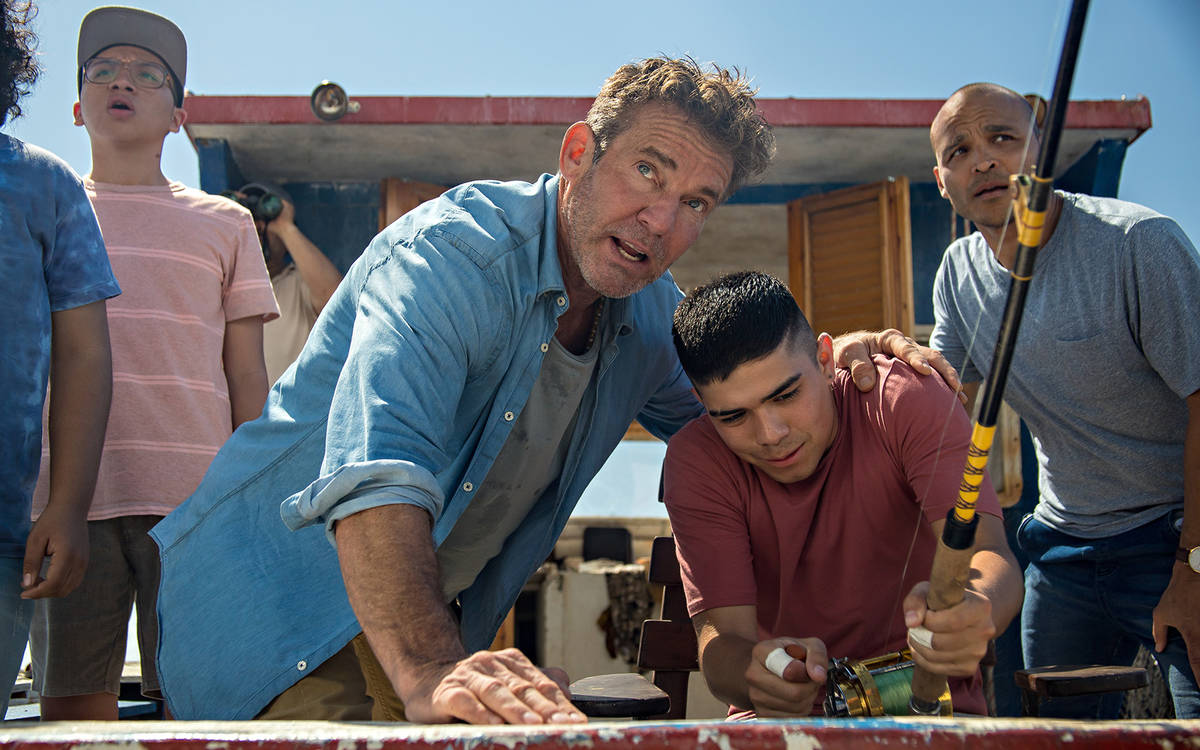
Netflix’s new movie “Blue Miracle” has all the makings of a summer blockbuster.
It’s the heartwarming story of a group of orphans who have found a new home and family at an orphanage in Cabo San Lucas, Mexico. Their happy existence, however, is under the threat of being undermined as the home’s “parents” face foreclosure due to a lack of money.
If that wasn’t enough for them to worry about, a hurricane hits the community and severely damages the facility.
The opportunity for salvation comes in the form of the city’s world-renowned fishing tournament, which has millions of prize dollars to award and the rare chance for them to compete after organizers open the event to local teams because of the hurricane.
The odds are against them, but they have faith. And, of course, they end up winning the tournament.
The film is based on the true story of Casa Hogar.
While there was quite a bit of “movie magic” in the telling of Casa Hogar’s story, Donna Saunders of Boulder City, who is the orphanage’s board of directors and heads its nonprofit International Community Foundation to accept donations, said the fish tale is making waves for a different reason.
She said the film has turned into a “green miracle” for an orphanage. The timing of its release is helping counter the lack of donations as a result of the COVID-19 pandemic as people from around the world are reaching out to help.
It also gave the orphanage’s residents some excitement as they had a chance to video chat with the film’s main stars, Dennis Quaid and Jimmy Gonzales.
“The whole goal (of the movie) is a positive lesson about making the right choices. If you do the right thing, then you will be rewarded,” she said.
Saunders, who visits Casa Hogar and Cabo San Lucas about once every three or four months, said she was there right after Hurricane Odile hit the community in 2014 to help with cleanup efforts and bring in water purification devices.
She said the orphanage suffered quite a bit of water damage and the “movie doesn’t touch upon how bad it was.” Some people were lighting fires in their driveways to keep vandals from looting, she said.
Many of the boats that would have been used by fishermen competing in Bisbee’s Black &Blue tournament were ruined, which is why they changed the rules for that year and allowed only boats 30 feet or shorter to compete.
A donor paid the $5,000 entry fee for the owners of many of the smaller boats, including the one that the team from Casa Hogar was on.
Saunders herself gave Omar Castaneda, the home’s “father,” the money for a side bet into the pot that turned Casa Hogar’s $70,000 first-place prize into $258,000.
Even though Castaneda had never fished before, Saunders said his faith, energy, enthusiasm and positive attitude contributed to his catching the winning fish — a 385-pound marlin.
Saunders said she first became aware of Casa Hogar 14 years ago while visiting a Rotary club in Cabo San Lucas, where she was vacationing. They had donated land for the future orphanage and she was asked if the Boulder City club might be able to help with some fundraising to get the facility built.
As incoming president of Boulder City Sunrise Rotary, she thought it was a great idea for an international service project and a way to give back to the community she had grown to love.
Saunders said it took two years to get the design and necessary permits.
Not a traditional orphanage, Casa Hogar is the only privately owned social services center in Cabo San Lucas. It receives no governmental assistance and its residents are placed at the facility after being removed from unsafe living conditions.
Their first ward was a young boy whose father was using him as a drug mule, she said.
When it first opened, it was only accepting boys. Now, the home is open to girls as well and recently expanded to include a transitional housing facility for those who are 18 or older. It has 32 residents and two in the transitional housing center.
According to Saunders, children are only allowed to stay until they are 18. Not being able to fully prepare them for life on their own as adults was something she considered one of their biggest failures.
The transitional center, which features “condos” made out of shipping containers, provides housing as long as the residents are working to better themselves by going to school or working, she said.
Saunders said she has remained involved with Casa Hogar because of the difference it can make in a child’s life.
“Even if they are only there for six months, something will stick in their brain. If we can make a difference, then we have done something.”
Hali Bernstein Saylor is editor of the Boulder City Review. She can be reached at hsaylor@bouldercityreview.com or at 702-586-9523. Follow @HalisComment on Twitter.